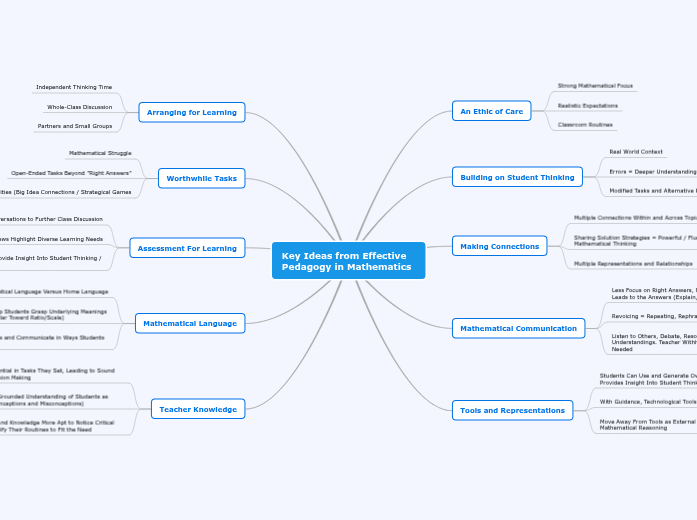Key Ideas from Effective Pedagogy in Mathematics
An Ethic of Care
Strong Mathematical Focus
Realistic Expectations
Classroom Routines
Building on Student Thinking
Real World Context
Errors = Deeper Understandings
Modified Tasks and Alternative Pathways
Making Connections
Multiple Connections Within and Across Topics
Sharing Solution Strategies = Powerful / Fluent / Accurate Mathematical Thinking
Multiple Representations and Relationships
Mathematical Communication
Less Focus on Right Answers, More Focus on Thinking That Leads to the Answers (Explain, Defend, Justify)
Revoicing = Repeating, Rephrasing, Expanding on Student Talk
Listen to Others, Debate, Resolve Conflict, Arrive at Common Understandings. Teacher Withholds Own Explanations Until Needed
Tools and Representations
Students Can Use and Generate Own Representations - It Provides Insight Into Student Thinking
With Guidance, Technological Tools Can Link to the Real World
Move Away From Tools as External Aids Toward a Part of Mathematical Reasoning
Arranging for Learning
Independent Thinking Time
Whole-Class Discussion
Partners and Small Groups
Worthwhile Tasks
Mathematical Struggle
Open-Ended Tasks Beyond "Right Answers"
Practice Activities (Big Idea Connections / Strategical Games
Assessment For Learning
Observe Students / Conversations to Further Class Discussion
1-on-1 Interviews Highlight Diverse Learning Needs
Open-Ended Questions Provide Insight Into Student Thinking / Reasoning
Mathematical Language
Mathematical Language Versus Home Language
Code Switching Can Help Students Grasp Underlying Meanings (e.g., Moving From Similar Toward Ratio/Scale)
Model Appropriate Terms and Communicate in Ways Students Understand
Teacher Knowledge
Teachers See Potential in Tasks They Set, Leading to Sound Instructional Decision Making
Teachers Need a Grounded Understanding of Students as Learners (e.g., Conceptions and Misconceptions)
Teachers With Sound Knowledge More Apt to Notice Critical Moments and Modify Their Routines to Fit the Need
